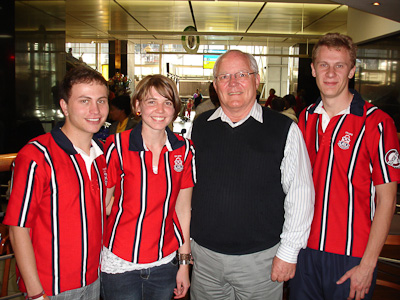Latest News Archive
Please select Category, Year, and then Month to display items
12 January 2024
|
Story Nonsindiswe Qwabe
|
Photo Sonia Small
 Since joining the UFS in 2008, Dr Grey Magaiza has worked extensively on approaches that can foster the socio-economic transformation of societies.
Since joining the UFS in 2008, Dr Grey Magaiza has worked extensively on approaches that can foster the socio-economic transformation of societies.
“The future should be one where communities can decide on their development agenda and futures. That’s the most important for me.” Dr Grey Magaiza, Deputy Director of the Centre for Gender and Africa Studies (CGAS) and Head of the Community Development programme on the Qwaqwa Campus, is passionate about capacitating communities to be agents of change and advancement. His vision for the future emphasises the empowerment of communities to take charge of their development by actively participating in decision making and the implementation of development projects that can improve their lives.
Since joining the UFS in 2008, Dr Magaiza has worked extensively on approaches that can foster the socio-economic transformation of societies. Over the years, he has crafted his research speciality into one that he is most proud of – being an interdisciplinary scientist immersed in the development of communities.
“I’m in a fortunate position of researching what I like. I say ‘fortunate’, because I’ve taken the time to understand what I’m passionate about, which is the overall field of rural livelihoods and livelihood futures – in short, community development. My research starts from an engaged university, understanding the elements that a university must use to enhance transformation and relevance to its immediate community in terms of development.”
One of the ways he has done this is by looking at social entrepreneurship as a development approach for young people in a rural setting. Through workshops with non-profit and civic organisations in Qwaqwa, Dr Magaiza has been helping these organisations to map out their needs and actively meet them through the involvement and support of external role players.
“We understand that communities are part of the national development agenda, but even that national agenda respects community knowledge and intentions and allows communities to shape their identity. A critical enabler of this is community organising. You bring back the capacity in communities to have dialogues on issues affecting them as spaces for engagement, knowledge exchange, and for people to just talk about their way forward.”
By enabling communities to define their development agenda, they can address their specific needs, challenges, and aspirations, he said. “When I look at livelihood futures, it’s quite an exciting aspect of my work – it’s like looking into a fortune tellers’ globe, because you’re not deciding for communities what they should do, but the communities themselves take those decisions.”
Kovsies still enjoy successful exchange opportunity
2010-08-25
 |
| Students Ian Botha, Lize Swart and SW Meintjies with Prof. Izak Groenewald (second from right) at the O.R. Tambo International Airport in Johannesburg upon the student’s recent departure to Virginia Tech. Photo: Supplied |
More than a decade ago, the then Chairperson of Free State Agriculture, Piet Gous, in collaboration with the then Dean of the Faculty of Natural and Agricultural Sciences at the University of the Free State (UFS), Prof. Piet Wilke, started an exchange initiative which still makes a difference to students’ lives today.
Students at the university get the opportunity to go and study at the Virginia Polytechnic Institute and State University (Virginia Tech) in Blacksburg in the United States of America (USA) during the second semester. During the first semester the UFS then receive American students. Since its inception in 1998, 142 students have already participated in the exchange programme.
“It is not only about six months’ studies at an American university. It is about the expansion of horizons, the creation of new frames of reference and exposure to other cultures and customs in order to attain and experience more life capacity,” says Prof. Izak Groenewald, Director of the Centre for Sustainable Agriculture and Rural Development at the UFS. Prof. Groenewald has acted as coordinator of this student exchange programme since 1997.
According to Prof. Groenewald, the secret of the successful programme rests with the fact that Kovsies pay their tuition and accommodation fees at the UFS as if they were studying here. However, they enjoy the privileges at Virginia Tech. Similarly, the American students pay their corresponding fees at Virginia Tech and then enjoy the privileges offered by the UFS.